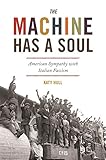The Machine Has a Soul : American Sympathy with Italian Fascism / Katy Hull.
Material type: TextSeries: America in the World ; 39Publisher: Princeton, NJ : Princeton University Press, [2021]Copyright date: ©2021Description: 1 online resource (272 p.) : 15 b/w illusContent type:
TextSeries: America in the World ; 39Publisher: Princeton, NJ : Princeton University Press, [2021]Copyright date: ©2021Description: 1 online resource (272 p.) : 15 b/w illusContent type: - 9780691208121
- Fascism-Italy
- HISTORY / United States / 20th Century
- Anne O'Hare McCormick
- Columbia University
- Fascist Modernities
- Fascist youth programs
- Generoso Pope
- Herbert Schneider
- Italy
- John Diggins
- Jonah Goldberg
- Liberal Fascism
- Modernism and Fascism
- Mussolini and Fascism
- Mussolini
- Nazi Germany
- New York Times
- Richard Washburn Child
- Roger Griffin
- Ruth Ben-Ghiat
- Victorian ideals
- authoritarianism
- corporate state
- fascist militarism
- fascist squadrism
- fascist state
- great depression
- il Duce
- invasion of Ethiopia
- materialism
- modernism
- modernity
- moral philosophy
- nihilism
- propaganda
- squadrism
- squadrist violence
- sympathizers
- transnational
- online - DeGruyter
| Item type | Current library | Call number | URL | Status | Notes | Barcode | |
|---|---|---|---|---|---|---|---|
 eBook
eBook
|
Biblioteca "Angelicum" Pont. Univ. S.Tommaso d'Aquino Nuvola online | online - DeGruyter (Browse shelf(Opens below)) | Online access | Not for loan (Accesso limitato) | Accesso per gli utenti autorizzati / Access for authorized users | (dgr)9780691208121 |
Frontmatter -- Contents -- List of Illustrations -- Acknowledgments -- Abbreviations -- Introduction: The Machine with a Soul -- 1. The Good Adventure: Fascist Squads in a War-Weary World -- 2 Mystic in a Morning Coat: Americans’ Mussolini in the 1920s -- 3 The Dream Machine: The Fascist State in an Era of Democratic Disillusionment -- 4 Man as the Measure of All Things: Sympathizing with Fascism in the Early Depression Years -- 5 The Garden of Fascism: Beauty, Transcendence, and Peace in an Era of Uncertainty -- Conclusion: Searching for Soul under the Sign of the Machine -- Notes -- References -- Index
restricted access online access with authorization star
http://purl.org/coar/access_right/c_16ec
A historical look at the American fascination with Italian fascism during the interwar periodIn the interwar years, the United States grappled with economic volatility and Americans expressed anxieties about a decline in moral values, the erosion of families and communities, and the decay of democracy. These issues prompted a profound ambivalence toward modernity, leading some individuals to turn to Italian fascism as a possible solution for the problems facing the country. The Machine Has a Soul delves into why Americans of all stripes sympathized with Italian fascism, and shows that fascism’s appeal rested in the image of Mussolini’s regime as “the machine which will run and has a soul”—a seemingly efficient and technologically advanced system that upheld tradition, religion, and family.Katy Hull focuses on four prominent American sympathizers: Richard Washburn Child, a conservative diplomat and Republican operative; Anne O’Hare McCormick, a distinguished New York Times journalist; Generoso Pope, an Italian-American publisher and Democratic political broker; and Herbert Wallace Schneider, a Columbia University professor of moral philosophy. In fascism’s violent squads they saw youthful glamour and impeccable manners, in the megalomaniacal Mussolini they perceived someone both current and old-fashioned, and in the corporate state they witnessed a politics that could revive addled minds. They argued that with the right course of action, the United States could use fascism to take the best from modernity while withstanding its harmful effects.Investigating the motivations of American fascist sympathizers, The Machine Has a Soul offers provocative lessons about authoritarianism’s appeal during times of intense cultural, social, and economic strain.
Mode of access: Internet via World Wide Web.
In English.
Description based on online resource; title from PDF title page (publisher's Web site, viewed 01. Dez 2022)


